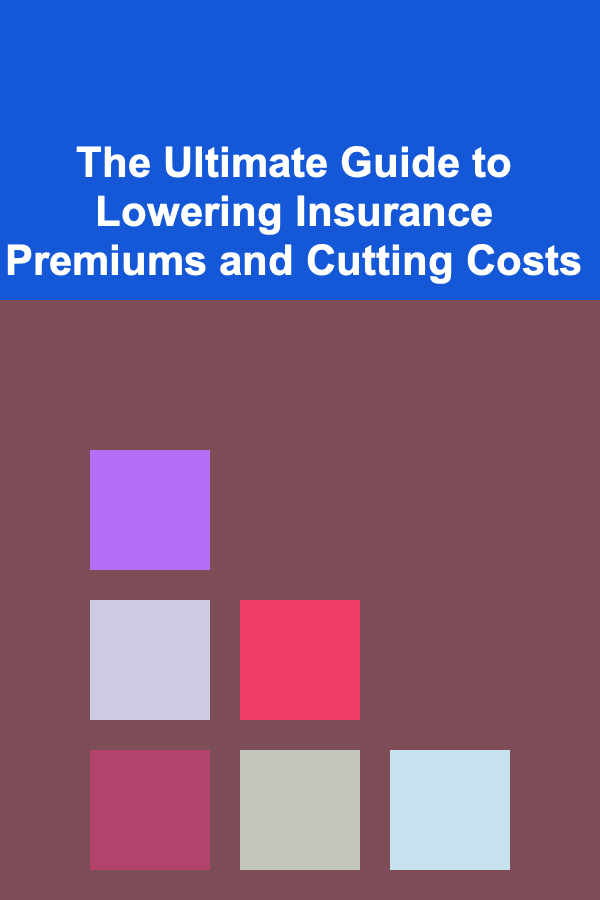
10 Tips for Lowering Your Homeowners Insurance Premium
ebook include PDF & Audio bundle (Micro Guide)
$12.99$11.99
Limited Time Offer! Order within the next:
Not available at this time

Homeowners insurance is essential for protecting your property and assets from unexpected events such as fires, natural disasters, theft, or liability claims. However, for many homeowners, the cost of insurance premiums can become a significant financial burden. While you can't always control external factors like natural disasters or rising insurance rates, there are several strategies you can implement to lower your homeowners insurance premiums without compromising your coverage.
In this article, we'll explore 10 effective ways to reduce your homeowners insurance premium, giving you more control over your policy's cost and helping you keep more money in your pocket.
Increase Your Deductible
One of the simplest ways to lower your homeowners insurance premium is by increasing your deductible. The deductible is the amount you'll pay out of pocket before your insurance coverage kicks in. In general, the higher your deductible, the lower your premium will be. Insurance companies reward homeowners who take on more risk by lowering their premiums, as the insurer's payout responsibility is reduced.
How to Increase Your Deductible:
- Assess Your Financial Situation: Before raising your deductible, make sure you can comfortably cover the higher amount in the event of a claim.
- Balance Premium vs. Deductible: It's important to find a balance between a manageable deductible and affordable premium. A high deductible can lower your premium, but it could be costly if you need to make a claim.
By raising your deductible, you can save a significant amount on your premium each year. However, it's crucial to ensure that you have enough funds set aside to cover the higher deductible if necessary.
Bundle Your Policies
Many insurance companies offer discounts to customers who bundle multiple types of insurance with them. If you have multiple insurance policies---such as auto, life, or health insurance---consider bundling them together with your homeowners insurance to secure a better deal. Insurance providers often offer a significant discount for bundling policies, which can help you save on your homeowners insurance premiums.
How to Bundle Your Policies:
- Talk to Your Insurance Provider: Reach out to your current insurer to see if they offer bundling discounts. If you already have other policies with them, ask about the discount you could receive by combining your home and auto or other insurance.
- Compare Bundling Offers: If your current insurer doesn't offer a bundling discount or if the discount is minimal, consider comparing offers from other insurance companies. Bundling can be a great way to save, but it's important to compare the total cost of premiums to ensure you're getting the best deal.
By bundling your policies, you can save money on both your homeowners and other types of insurance, simplifying your insurance coverage in the process.
Improve Your Home's Security Features
Insurance companies often offer discounts for homeowners who install security systems and other safety features in their homes. A home that is more secure is less likely to be broken into or damaged, which reduces the insurer's risk. Installing devices like burglar alarms, smoke detectors, and fire sprinklers can help lower your premium.
Home Security Features to Consider:
- Burglar Alarms: Installing a professionally monitored security system can make your home less susceptible to break-ins, which can lead to significant savings on your premium.
- Smoke Detectors and Fire Extinguishers: These devices are a must-have for any home. Some insurers offer discounts for having multiple smoke detectors installed in your home.
- Deadbolt Locks: Strong locks on doors and windows may reduce the risk of theft, leading to potential premium reductions.
- Surveillance Cameras: If you have a security camera system, especially one that's monitored, you may qualify for discounts.
By investing in security features, you not only make your home safer but also potentially lower your homeowners insurance premiums. The upfront cost of installing these features could be outweighed by long-term savings.
Maintain a Good Credit Score
Many insurance companies use your credit score as a factor in determining your premium. A higher credit score typically indicates that you're a lower risk for the insurer, meaning you're more likely to pay premiums on time and less likely to file claims. Therefore, maintaining a good credit score can directly impact your homeowners insurance rates.
How to Improve Your Credit Score:
- Pay Bills on Time: Consistently paying your bills on time, including credit cards, loans, and other debts, can help boost your credit score.
- Keep Credit Utilization Low: Aim to keep your credit card balances well below the credit limit to improve your credit score.
- Review Your Credit Report: Regularly check your credit report for errors or inaccuracies that could be negatively affecting your score.
Improving your credit score can lead to lower premiums, so it's worth the effort to maintain a strong credit history.
Review and Adjust Your Coverage Regularly
It's important to regularly review your homeowners insurance policy to ensure that you're not over-insured or under-insured. Over-insuring can lead to unnecessarily high premiums, while under-insuring could leave you financially vulnerable in the event of a claim.
Steps to Adjust Your Coverage:
- Evaluate Your Home's Value: Ensure that the coverage limit on your policy reflects the current value of your home and belongings. If your home's value has decreased, you may be able to lower your coverage limit and reduce your premium.
- Review Your Personal Property Coverage: Assess whether you need coverage for items like jewelry, electronics, or collectibles. If you have fewer valuable items than when you first took out the policy, reducing your coverage on personal property could save you money.
- Consider Optional Coverage: Optional coverage such as flood or earthquake insurance may be necessary depending on your location, but it's important to reassess whether you still need it. If you've already added safety features or moved to a lower-risk area, you may not need all of the extra coverage.
By regularly adjusting your coverage, you can ensure that you're paying for the right level of protection without paying for unnecessary extras.
Ask About Discounts
Many homeowners aren't aware that they may qualify for various discounts. Insurance providers often offer a range of discounts for things like being a new homeowner, being claim-free, or having a home that's more energy-efficient. Simply asking your insurance provider about available discounts can lead to substantial savings.
Common Homeowners Insurance Discounts:
- Claim-Free Discount: If you haven't filed any claims in several years, you might be eligible for a claim-free discount.
- New Home Discount: Newly built homes often come with lower premiums due to modern building materials and construction techniques.
- Loyalty Discount: Some insurance companies offer discounts for long-term customers who have been with the same provider for several years.
- Energy-Efficiency Discount: If you've made energy-efficient upgrades to your home, such as installing new windows or insulation, you might qualify for discounts.
- Non-Smoker Discount: Many insurance companies offer lower premiums to non-smokers due to the reduced risk of fire hazards.
Take the time to inquire about all available discounts to make sure you're not missing out on savings.
Choose the Right Type of Coverage
Homeowners insurance typically comes in different types of coverage options, such as actual cash value (ACV) and replacement cost coverage. ACV policies pay out the value of your home or belongings after depreciation, while replacement cost policies pay out the full cost to replace items or repair your home. Replacement cost coverage can be more expensive, so choosing the right type of coverage can impact your premiums.
How to Choose the Right Coverage:
- Actual Cash Value (ACV): ACV policies may be cheaper, but they pay less in the event of a claim because they factor in depreciation.
- Replacement Cost Coverage: While more expensive, replacement cost coverage provides a higher payout, which may be necessary for higher-value items or homes.
Choosing the right coverage for your needs will help you balance premium costs with adequate protection.
Shop Around for the Best Rates
Homeowners insurance rates can vary significantly between providers. Shopping around and comparing quotes from different insurance companies is a smart way to ensure you're getting the best deal.
How to Shop for Homeowners Insurance:
- Get Multiple Quotes: Contact several insurers to get quotes and compare their prices, coverage options, and discounts.
- Check Reviews and Ratings: While price is important, it's also essential to choose an insurer with a good reputation for customer service and claims handling.
- Consider Local Insurers: Sometimes smaller, local insurance companies offer better rates and personalized service.
Shopping around for insurance not only helps you find a lower premium but also gives you peace of mind that you're getting the best coverage for your needs.
Maintain Your Home Regularly
Regular maintenance of your home can help prevent costly repairs and reduce your risk of filing an insurance claim. Insurance companies often consider well-maintained homes to be lower risk, which could result in lower premiums.
Regular Maintenance Tips:
- Roof Inspections: Regularly inspect your roof for damage, and fix any issues promptly to prevent leaks or further damage.
- Plumbing and Electrical: Ensure that your plumbing and electrical systems are in good condition to avoid costly water or fire damage.
- Clear Gutters: Clean your gutters regularly to prevent water damage to your roof and foundation.
By maintaining your home, you reduce the risk of accidents and damage, which may help lower your insurance premiums over time.
Consider a Home Inventory
Having a home inventory can be incredibly helpful in the event of a claim. It helps you keep track of the value of your belongings and ensures that you're adequately covered in the event of a loss. An accurate inventory also helps ensure that you're not over-insured, which can lead to unnecessary premium increases.
How to Create a Home Inventory:
- List Your Belongings: Go through each room and list valuable items, noting their value and condition.
- Take Photos or Videos: Document your belongings with photos or videos to provide evidence in case of a claim.
- Store the Inventory Safely: Keep a copy of your inventory in a secure place, such as a cloud storage service or a fireproof safe.
Having a home inventory ensures that you only pay for the coverage you need, and it can also expedite the claims process.
Conclusion
Lowering your homeowners insurance premium doesn't have to involve sacrificing your coverage or protection. By implementing the tips outlined in this article---such as increasing your deductible, bundling policies, improving your home's security, and maintaining a good credit score---you can significantly reduce your insurance costs. Regularly reviewing your coverage, shopping around for the best rates, and maintaining your home are also effective strategies for lowering premiums without compromising on protection. With a little effort and planning, you can keep your homeowners insurance premiums affordable and your home well-protected.

How to Build a Sustainable Investment Portfolio
Read More
How to Create a Modern Home on a Budget
Read More
How to Use Digital Planners to Schedule Your Life
Read More
How to Use Labels for Clear Home Inventory Organization
Read More
The Ultimate Guide to Lowering Insurance Premiums and Cutting Costs
Read More
What Steps Can You Take to Keep Your Fridge Organized?
Read MoreOther Products

How to Build a Sustainable Investment Portfolio
Read More
How to Create a Modern Home on a Budget
Read More
How to Use Digital Planners to Schedule Your Life
Read More
How to Use Labels for Clear Home Inventory Organization
Read More
The Ultimate Guide to Lowering Insurance Premiums and Cutting Costs
Read More